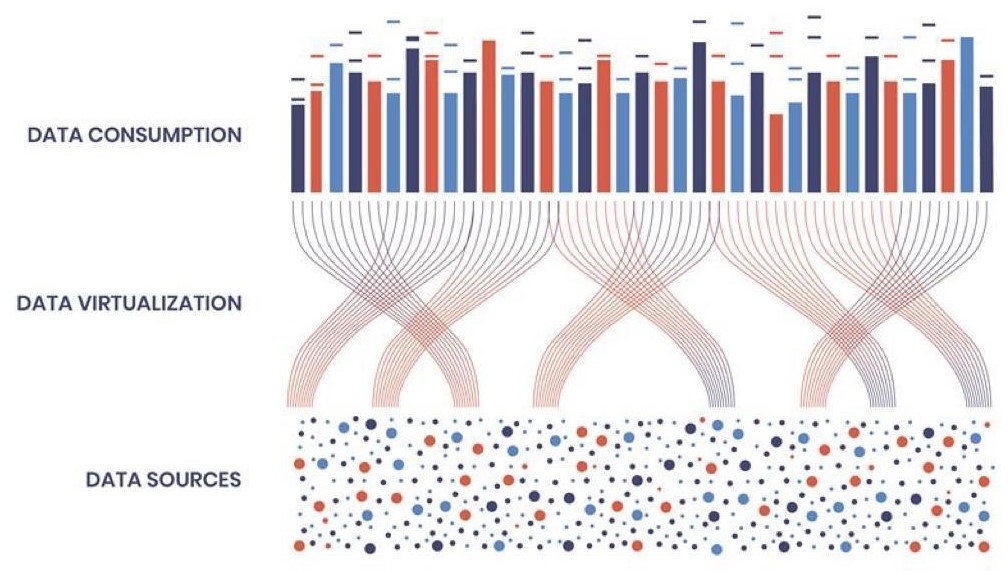
Listen to this blog
Imagine having all your data in one place, accessible in real-time, and ready to be analyzed with just a few clicks. Sounds too good to be true, right? Well, that's exactly what data virtualization can do for your organization. It's a critical component of modern data platforms, and it's revolutionizing the way we access, integrate, and analyze data.
What Exactly is Data Virtualization?
Think of it as a virtual data layer that sits on top of all your disparate data sources and provides a single access point to all your data. It's like a librarian who takes all the books in the library and organizes them into a single catalog, making it easier for you to find what you're looking for. Data virtualization does the same for your data, regardless of where it's stored. It is the process of creating virtual data sets without copying or transforming the underlying data. This allows organizations to access unified data and present it to business users in the best way possible.
Why is Data Virtualization so Important for Modern Data Platforms?
In today's fast-paced business environment, organizations need to make quick, informed decisions based on real-time data. That's where data virtualization comes in. It enables organizations to access data from a variety of sources, including databases, cloud services, and IoT devices, all in real-time. No more waiting for data to be moved or copied, no more inaccurate data, and no more complicated data management processes.
Another outstanding capability of data virtualization is its ability to provide a unified view of data across different data domains. Data domains are the different categories or types of data that you work with, such as customer data, sales data, and financial data. By providing a single access point to all your data, data virtualization eliminates the need to switch between different data sources or systems, streamlining your data management process and making it easier to get a complete picture of your data.

Key Features of Data Virtualization:
- Logical Data Layer: The logical data layer is the backbone of data virtualization. It acts as a virtual layer that enables business users to access all enterprise data without the need for replicating it. This means that instead of duplicating data across multiple systems, data virtualization creates a single, virtual representation of the data that is easily accessible to all users.
- Data Integration: One of the biggest challenges faced by organizations today is the integration of disparate and siloed data from multiple sources. Data virtualization addresses this challenge by integrating and unifying data from multiple sources to provide a complete view of the data.
- Data Management: Data virtualization provides a centralized, secure layer that enables users to ensure data quality and implement governance policies to manage data and its relationships.
- Data Acceleration: Data Virtualization provides data acceleration, enabling organizations to access data faster and more efficiently for data analysis and decision-making. This improves the performance of data-intensive applications and enables organizations to respond more quickly to changing business needs.
- Centralized Data Repository: Facilitates a centralized data repository by providing a virtual layer of abstraction between the physical data sources and the users. This minimizes the need for data duplication and consolidation, thereby reducing costs and complexities.
- Real-time Delivery: Real-time delivery is one of the most significant advantages of data virtualization. It enables data to be fetched in real-time from source systems and made available to business users on demand. This means that users have access to the most up-to-date and accurate data, allowing them to make informed decisions in real time. Real-time delivery also minimizes the time and cost involved in data replication, as data virtualization fetches data on-demand, rather than replicating it across multiple systems.
Benefits of Data Virtualization for Organizations:
In today's fast-paced business environment, organizations need quick and easy access to accurate data to make informed decisions. This is where data virtualization comes in, providing a unified view of all enterprise data in real time. Here are some of the key benefits of data virtualization for organizations:
- Real-time Insights: This enables organizations to make decisions based on the latest and most accurate data, avoiding reliance on outdated information.
- Elimination of Data Silos: Provides a unified, real-time view of disparate data sources, enabling efficient data access, integration, and management, and breaking down data silos.
- Cost Savings: By eliminating the need for data replication and duplication, data virtualization saves organizations money on storage costs and simplifies the data management process.
- Increased Agility: Allows organizations to quickly access data from disparate sources, enabling faster decision-making and action-taking, and increasing business agility.
- Enhanced Security: Provides a secure and controlled environment for accessing and analyzing data, reducing the risk of data breaches and theft.
- Scalability: Data virtualization can scale up or down to meet an organization's evolving needs, allowing it to efficiently handle growing volumes of data and users.
- Self-Service Data & Analytics: With data virtualization, users can access and analyze data without the need for IT assistance, enabling self-service data exploration and reducing the burden on IT departments.
- Advanced Analytics & Business Intelligence: Data virtualization enables organizations to quickly and easily integrate data from multiple sources to support business intelligence and analytics initiatives.
- Improved Data Quality: By providing a centralized and controlled layer for data management, data virtualization enables organizations to improve data quality and reduce errors.
- Rapid Deployment: Data virtualization can be quickly deployed, enabling organizations to begin realizing its benefits with minimal disruption to existing systems and processes.
Data virtualization is transforming the way various industries analyze and utilize their data. Lets take an example within the healthcare industry; a pharmaceutical company needs to analyze large amounts of clinical trial data to determine the safety and efficacy of its drugs. With data virtualization, this company can access and analyze all its data in real-time, from a single, virtual data layer. This eliminates the need for manual data integration and ensures that the company is always working with the latest and most accurate information. By providing an enhanced data platform, data virtualization is enabling the pharmaceutical company to make informed decisions about its drug development process and bring new drugs to market more quickly and efficiently.
This real-world example illustrates the practical benefits of data virtualization and shows how it can help companies in specific industries overcome their data challenges. The bottom line is data virtualization is a must-have for organizations looking to get the most out of their data. It provides organizations with the foundation they need to drive innovation, make better decisions, and stay ahead of the competition.
At Visionet, we understand the importance of data virtualization in modern data platforms. We help businesses enjoy the benefits of a modern data platform by providing enhanced data virtualization solutions that unlock the full potential of their data. Our solutions are designed to meet the unique needs of each business, allowing them to access, integrate, and analyze their data in real-time.
With our expertise and experience, we can help you build a modern data platform that meets your specific needs. From optimizing data storage to improving data security, we provide comprehensive solutions that help organizations make informed decisions and stay ahead of the competition. Contact us at Visionet to learn more about how we can help you achieve your data virtualization goals.
Don't get left behind in the data revolution. Embrace data virtualization and unlock the full potential of your data today!




